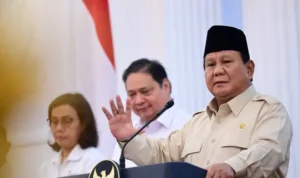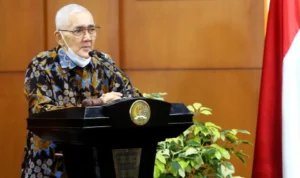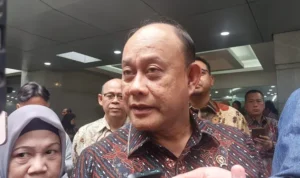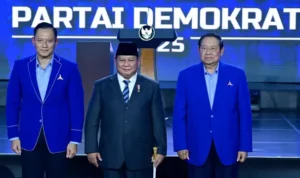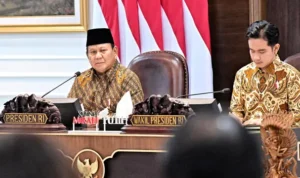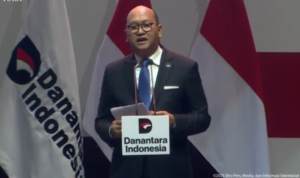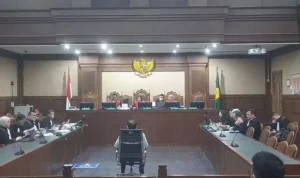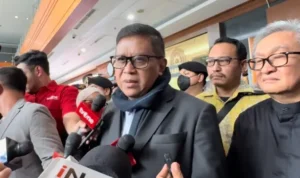INDONESIAUPDATES.COM, News En – On Monday, February 3, 2025, President Prabowo Subianto conducted an unannounced inspection of the free school meal program in East Jakarta, less than a month after the initiative’s official launch. This move comes as part of Prabowo’s ongoing effort to ensure the success of his flagship program, which played a pivotal role in his victory in the presidential election.
Accompanied by Cabinet Secretary Teddy Indra Wijaya, Prabowo visited SDN 05 Jati, a state elementary school, and TK Negeri 02, a local kindergarten, to observe firsthand the distribution and quality of meals served to students. The visit was met with excitement as children at the schools cheered on the president’s arrival, as seen in a video posted on Instagram by @inforawamangun.
“The president also made a stop at a public kitchen in Pulo Gadung, where meals are prepared before being distributed to schools in the area,” reported Teddy Indra Wijaya. The public kitchen, which plays a crucial role in the logistics of the program, was inspected by the president, who arrived around 10:23 a.m.
During the inspection, Prabowo engaged with kitchen staff, asking about the daily routines of meal preparation. He inquired about the start time for meal prep and examined the selected menu for the day, emphasizing the importance of quality and nutrition for the students. “Peace be upon you. Are you all on duty?” Prabowo asked the kitchen staff, to which the manager confirmed, explaining that the facility was responsible for preparing the vegetables and other ingredients for the meals.
The Free School Meal Program, which was officially launched on January 6, 2025, aims to provide free, nutrient-rich meals to approximately 83 million students and expectant mothers across Indonesia. The program, which forms a central part of Prabowo’s election campaign, is intended to combat malnutrition and stunting, a pressing issue in the country. As of 2023, Indonesia’s national stunting rate stood at 21.5%, and the program is seen as a major step toward improving public health outcomes.
With an estimated cost of Rp 71 trillion ($4.3 billion) for 2025, the free meal program is one of the largest government-funded initiatives in the country. The initiative has garnered significant attention from the government, with presidential spokesman Hasan Nasbi previously hinting at Prabowo’s impromptu school visits to monitor its implementation.
The National Nutrition Agency (Badan Ketahanan Pangan), under the leadership of Dadan Hindayana, is tasked with overseeing the rollout of the program. However, Hindayana had previously stated that the timing of Prabowo’s surprise inspections could not be predicted, making the Monday visit a noteworthy move in ensuring the program’s smooth operation.
As President Prabowo continues to prioritize the success of the free meal initiative, his surprise inspection underscores his commitment to addressing malnutrition and stunting in Indonesia, demonstrating his direct involvement in one of the most significant welfare programs in the country’s history.
Frequently Asked Questions (FAQ) about the Free School Meal Program
- What is the Free School Meal Program?
The Free School Meal Program is a government initiative launched by President Prabowo Subianto in January 2025, aimed at providing free, nutrient-rich meals to approximately 83 million students and expectant mothers across Indonesia. The program is designed to combat malnutrition and reduce the national stunting rate. - Why was the program launched?
The program was introduced as part of President Prabowo’s campaign promise to improve public health and combat malnutrition. It aims to address Indonesia’s national stunting rate, which stood at 21.5% in 2023, by providing students with nutritious meals to support their growth and development. - Who is eligible for the free meals?
The program provides free meals to students from kindergarten to high school, as well as expectant mothers. This initiative targets a large portion of Indonesia’s population, especially those from low-income families who may not have access to nutritious meals. - How is the program funded?
The program is funded by the Indonesian government, with an allocation of Rp 71 trillion ($4.3 billion) for 2025. The funds are used to cover the costs of meal preparation, distribution, and logistical support for the program across the country. - How are the meals prepared and distributed?
Meals are prepared at public kitchens, like the one in Pulo Gadung, Jakarta, where they are cooked and then distributed to schools in the area. The meals are planned to ensure they meet nutritional requirements, with a focus on providing students with a balanced diet. - What is the quality of the meals provided?
The meals are designed to be nutrient-rich and balanced, addressing key health concerns such as malnutrition. During a recent surprise inspection, President Prabowo personally reviewed the meal preparation process and asked kitchen staff about the meal selection to ensure the quality of the food being served to students. - How will the program help reduce stunting?
By providing consistent access to nutritious meals, the program aims to improve the health and growth of children, reducing the risk of stunting—a condition where children do not reach their full potential due to malnutrition. This is especially important for the development of young children in their early years. - How does the government ensure the program is running smoothly?
The government has implemented monitoring systems and conducts surprise inspections, such as the one made by President Prabowo. The National Nutrition Agency (Badan Ketahanan Pangan) is responsible for overseeing the program’s rollout and ensuring that it reaches all eligible recipients. - Is this program part of the government’s broader health initiatives?
Yes, the Free School Meal Program is part of a larger set of initiatives aimed at improving public health in Indonesia. It aligns with efforts to combat malnutrition, improve education outcomes, and address the nation’s stunting problem. - Can parents or communities get involved in the program?
The government encourages community participation in supporting the program’s success. Local authorities and schools may work together to help distribute meals and ensure that they reach those who need them most. Community members may also contribute by ensuring food safety and hygiene during distribution. - How long will the program run?
The Free School Meal Program is a long-term initiative that will continue throughout 2025 and is expected to be extended in future years, depending on its success and the government’s commitment to improving the health and well-being of Indonesia’s children and expectant mothers. - What are the next steps for the program?
Moving forward, the government plans to continue expanding the program, ensuring that it reaches more regions, especially remote and underserved areas. Monitoring and surprise inspections will continue to be carried out to maintain the program’s quality and effectiveness.
FOLLOW INDONESIAUPDATES.COM ON GOOGLE NEWS



